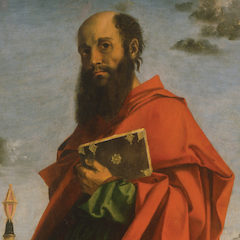Resources:
Activity:
A. Begin by asking your students if they will be watching the upcoming 2024 winter Olympics. Go around the room asking students to share their favorite sport of the games and why. You may wish to share yours as well.
B. Ask your students what they think it takes to qualify as a competitor in the Olympic games. Accept reasoned answers. Hard work, perseverance, a strong will to succeed, natural talent, years of training, optimism, etc.
C. Then, explain that all these virtues can be applied to our spiritual lives (our prayer, our habits, our works of mercy), and that St. Paul made the connection in his letters.
D. Distribute the handout: St. Paul On Striving for Heaven and have your students read the Scripture passages and answer the reflection questions 1–3 individually or in small groups.
E. When they are finished, call on groups to share their answers with the class.
F. Next, distribute or project the article The Spiritual life in Light of Sports, found at SophiaOnline.Org/SpiritualLifeInLightOfSports. Have your students read the article and answer reflection questions 4–8 either individually or in small groups.
G. When they are finished, call on students or groups to share their answers with the class as you lead a conversation on habits and perseverance in the spiritual life. You may wish to include the following questions:
H. Then, create a prayerful atmosphere and project for your students the video Training Vs. Working Out from Ascension Presents, found at: SophiaOnline.Org/RunSoAsToWin.
I. When the video has played, write the following reflection questions on the board and have your students answer them on their own paper:
- What words stood out to you most in the video? Why?
- How do you think Fr. Mike’s distinction between “training” and “working out” applies to our own spiritual lives?
- If a friend asked you what your goal in your spiritual life was, what would you say? How would you explain it to them?
I. When they have finished, call on students to share their answers to the first two questions as you lead a conversation on what it means to be images of Christ in the world, and what habits we might practice to attain this goal.
J. Conclude by inviting your students to keep their spiritual goals—and St, Paul’s advice– in mind as they watch the Olympic Games, and to remember the “crown of righteousness” (2 Timothy 4:8) that we are striving for as followers of Christ!
Answer Key
- Accept reasoned answers.
- Accept reasoned answers. He means that we should live our Faith with the purpose, or goal in mind, and let that ultimate goal influence all our actions and words.
- Accept reasoned answers.
- Accept reasoned answers. Both use the example of athletic training and competition to illustrate the inner spiritual life and pursuit of holiness and union with God. They show that our whole being, body and soul, is involved in the pursuit of holiness. We cannot separate our nature as body/soul composites. The analogy to athletics is fitting because our souls are informed and nurtured through our senses, our habits, and to an extent, our surroundings. Prayer and the habits of the spiritual life are not just internal, or spiritual–they are physical, they are actions and words practiced out of love for God and our neighbor.
- Accept resonated answers.
- Accept reasoned answers. We seek union with Him, relationship with Him, deeper wonder in the mystery of His love, deeper trust in His Divine Mercy, greater faith, an increase in hope, abiding charity, self-knowledge, and to see the world, ourselves, and our neighbor through His eyes and not our own.
- Accept reasoned answers. To repent, confess, and persevere trusting in God’s abounding love and mercy, for “There is no unforgivable sin, except the sin that is not repented.” –St. Isaac the Syrian
- Accept reasoned answers.


